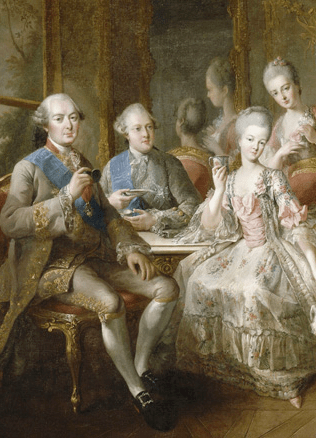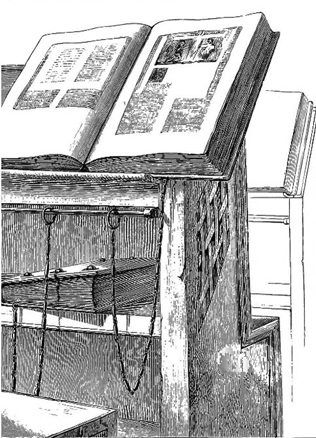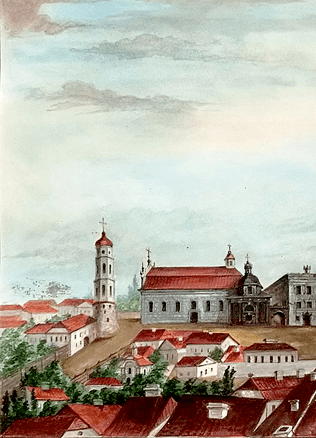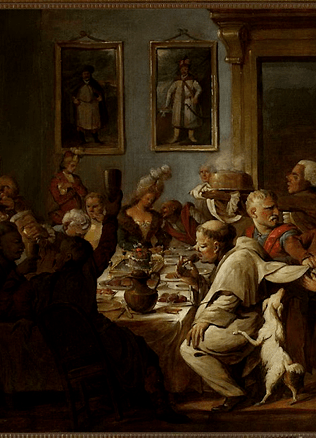Competition between Vilnius and Grodno for the well-being status of the capital
Due to its convenient geographical position, in the last quarter of the 17th century Grodno became a city in which, according to the 1673 law, every third Sejm of the Commonwealth of the Two Nations was convened. Though this rule was not followed strictly, the positions of Grodno strengthened as compared with the city of Vilnius because after the wars fought in the middle of the 17th century no residence of the Ruler was left in the capital of Lithuania. The main residence of the Ruler in the Grand Duchy of Lithuania was in Grodno where he arrived at least during the convocations of the Sejm.
In what did Grodno fail to please the Rulers?
Polish noblemen and rulers went to Grodno unwillingly; they said that the city was unfit for large conventions. Augustus III even called Grodno a “hated small town”. Under the rule of Stanislovas Augustas Poniatovskis (Pol. Stanisław August Poniatowski) the Sejm convened in Grodno especially rarely. Meetings were held there only in 1784 and in 1793. Therefore in his welcoming speech Kazimieras Nestoras Sapiega (Pol. Kazimierz Nesto Sapieha) reproached mildly the Ruler who arrived at the Grodno Sejm in 1784 as follows: “It has been thirty-two years already that Lithuania did not see legislative meetings in its nest”.
“
Augustus III even called Grodno a “hated small town”.
In the second half of the 18th century the tribunals took place in Grodno off and on, new state institutions established their headquarters there, the most important of which was the Treasury Commission of the Grand Duchy of Lithuania, which started its activities in 1764. On the initiative of the Treasurer of the Court Antanas Tyzenjauzas (Pol. Antoni Tyzenhauz) attempts were made to improve Grodno’s economy and to reorganise the city.
In Lithuania, the development of cities was determined by the geographical position of the cities, their economic and social development and convenient roads. The administrative system was also important to the cities. The functions of the capital increased the significance of Vilnius, the Ruler’s residence, which attracted the magnates and the gentry, provided a great stimulus to the growth of the city until the middle of the 17th century. Their commissions to the merchants and craftsmen encouraged the economic life of the city, especially trade. In the 18th century, Grodno failed to make use of the favourable situation due to rarely held meetings of the Sejm and rare visits of the Rulers. At the end of the 18th century the city was three times smaller than Vilnius. Another reason was common to all Lithuanian cities. From the middle of the 17th century (and due to the Northern wars at the beginning of the 18th century) the decreasing number of the urban population reached the number of the first half of the 17th century only at the end the 18th century.
The meetings of the gentry raised the prices
As in Vilnius, in which the Polish King and the Grand Duke of Lithuania arrived together with his court, in Grodno too, when the Sejm was convening, prices went up. In the description of his journey across Lithuania a German Michael Schultz gave the following account of his visit to Grodno in 1793 when the last Sejm of the Commonwealth of the Two Nations was convening: “Since the town is small for such conventions (…), apartments and living there were especially expensive. We had to pay two or three ducats for a small room and a bed daily and from eight to twelve Polish golden coins for satisfactory dinner. A one-horse cart of hay cost three or four ducats”. Though the burghers complained about the self-will of the gentry, disregard for the rights of the burghers, the delegates of the cities asked the Sejm to move the sitting of the gentry Sejmiks, courts, and sessions of the tribunal to their town. The number of such requests increased during the economic recession of the cities.
“
Though the burghers complained about the self-will of the gentry, disregard for the rights of the burghers, the delegates of the cities asked the Sejm to move the sitting of the gentry Sejmiks, courts, and sessions of the tribunal to their town.
In 1786, the Burgomaster of Minsk Ignas Tarankievičius (pol. Ignacy Tarankiewicz) complained about the gentry concerning their behaviour during the tribunal sessions but asked to bring back the sessions of the tribunal to the city because with the purchasing power decreasing, crafts and trade in the city declined. In 1782, visitors of the Kaunas parish explained that craftsmen lived in poverty in Kaunas because there were no meetings of the gentry, no public gatherings in the city, so they had nobody to produce for. The masters would have starved to death if they had not looked for work in the province.
A life-and-death struggle of Vilnius and Grodno
Exceptional positions of Grodno guaranteed by laws gradually weakened beginning with 1792 because on 1 February of that year the Sejm of the Commonwealth of the Two Nations decided to unite the Treasury Commission of the Grand Duchy of Lithuania and the Treasury Commission of the Polish Kingdom into a joint Treasury Commission of the Commonwealth of the Two Nations, and to move the headquarters of this institution to Warsaw. The Law was not implemented. The Treasury Commission of the Grand Duchy of Lithuania was in conference until the very end of the reforms of the Four-year Sejm in Grodno. The new wave of restructuring began in 1793 at the Grodno Sejm. The resolutions of the Sejm strengthened the statehood and independence of the Grand Duchy of Lithuania and decided to concentrate the state institutions of the Grand Duchy of Lithuania in Vilnius, the capital of Lithuania. It was decided not to revive the activity of the tribunals in Grodno – they had to be further held in Vilnius, and it was planned to move the sittings of the Tribunal from Minsk, which was occupied by Russia, to Navahrudak.
Discussions about the fate of Grodno in the Sejm broke out during its last sittings. The heads of the Treasury Commission of the Grand Duchy of Lithuania were really active when discussing this issue. On 22 November 1793, at the Sejm, the Treasurer of the Court of the Grand Duchy of Lithuania Antanas Džiekonskis (Pol. Antono Dziekoński) feared that “all Lithuanian institutions are being moved to Vilnius, and you, honourable members of the Sejm, see this city [Grodno] left to you, which will become impoverished when no magistracy is left in it, though at the present time it is growing and is being built. I think that the new law provides for very many things to do for the Treasury Commission, and namely, take care of the assets of the King’s economy and buildings constructed at the expense of his Royal Majesty”.
“
Discussions about the fate of Grodno in the Sejm broke out during its last sittings.
Antanas Džiekonskis explained that if it is not decided that the tribunals from that time would be held only in Vilnius, at least the headquarters of the Treasury Commission of the Grand Duchy of Lithuania must be left in Grodno. At the end of his speech he submitted the project to be considered at the Sejm and, expecting to receive support, appealed to the King in the following way: “Your Royal Majesty, you are the real father and creator of this city, you have cultivated it and raised it and have saved it from the downfall”. It was stated in the project that the Treasury Commission of the Grand Duchy of Lithuania would be left in Grodno, however, it aroused opposition in the Sejm. The envoys of Vilnius, Ašmena, Samogitia and other Lithuanian districts were most active in opposing the project. The turmoil stopped when the Marshal asked if all agreed that the Treasury Commission of the Grand Duchy of Lithuania, as has been established, should remain in Vilnius. According to the diary of the Sejm, the statement was approved by the envoys unanimously.
Reasonable fears of the dwellers of Grodno
On the last day of work of the Sejm (23 November), when the Law on the Lithuanian Tribunal was considered, the Treasurer of the Grand Duchy of Lithuania Mykolas Kleopas Oginskis (Michał Kleofas Ogińki) asked the Sejm that the tribunals should be held in Grodno rather than in Vilnius. This time the envoys from Kaunas and Lida protested immediately. M. K. Ogińki accentuated that due to the convenient geographical position of Grodno relations with the Kingdom of Poland can be maintained and underlined that joint Sejms would be held in Grodno all the same and that the residence of the Ruler was in Grodno too. According to Michał Kleofas Ogińki, it was impossible to neglect the city for these reasons. His proposal, however, was rejected vehemently too.
“
The burghers feared that after the noblemen and the gentry moved away from Grodno, the income would decrease, crafts, production and trade would decline; they feared that the residents would move away from the city and the city would “turn into a desert.”
The burghers of Grodno took an indirect part in the considerations too. They appealed to the Sejm and on 26 December 1793, they wrote a separate official letter to the King and the Permanent Council. They asked them to leave the sittings of the tribunal and the Treasury Commission of the Grand Duchy of Lithuania in Grodno. Having understood that they would not achieve that the sittings of the tribunal should be moved from Vilnius, they wanted the sittings of the tribunal, which had been held in Mink until the second partition provided for in Navahrudak, to be transferred to Grodno. The burghers explained that Grodno and its dwellers had sittings of the tribunal and the headquarters of the Treasury Commission of the Grand Duchy of Lithuania established by the earlier laws and laws in those days (like privileges) were often perceived to be eternal. The burghers feared that after the noblemen and the gentry moved away from Grodno, the income would decrease, crafts, production and trade would decline; they feared that the residents would move away from the city and the city would “turn into a desert.”
The laws adopted by the Sejm of 1793 were in effect for a short time because they were abolished by the authorities of the 1794 uprising. Governance in Lithuania was being centralised, and all the institutions were transferred to Vilnius. Though the central institutions of the public authorities were short of premises in the capital, the executive power of the Grand Duchy of Lithuania was concentrated there.
Liudas Glemža



